
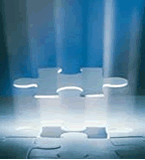 |
|
Integrated Home Care Systems for Scotland -
A Focus on Technologies
Colloquium: 21st March 2007, Glasgow

Proceedings
Presentations by speakers are available in PDF format, available by clicking on the titles of each talk below. Note that some of these files are very large. Copyright in the talks remains with the authors and their employers.
Venue
Teacher Building, 14 St Enoch Square, Glasgow (first floor lecture theatre)
Focus
This event was endorsed and supported by the IET (Institution of Engineering and Technology, formerly the IEE).
The colloquium brought together practitioners from different backgrounds and disciplines. It explored some of the social and technical challenges arising from these technologies. The goal was to highlight some of the issues involved and to establish consensus on approaches that minimise some of the difficulties.
The focus was on how technologies can benefit existing care procedures. The format consisted of invited presentations, coupled with informal discussions. The emphasis was on health and social care aspects, so a technical background was not required.
Target Audience
The event was aimed at practitioners working in this area, including those who are:
- involved in the delivery of home care
- implementing home care services that rely on technology
- interested in procedures and standards for supporting home care through technology
- developing home care technologies.
Aims
For home care in Scotland:
- to bring together for the first time an audience of those involved in healthcare, social care, and policy-making for the relevant technologies
- to establish partner networks and initiate dialogue on these technologies
- to identify the scope and direction for technology development and deployment.
Photos
The following photos illustrate some of the activities on the day.
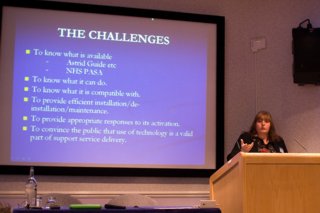
Linda Macpherson (Falkirk Council) giving her talk
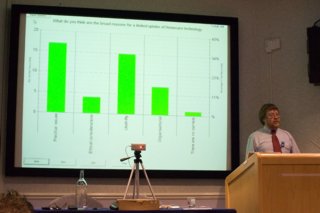
Evan Magill (University of Stirling) using the electronic voting
system
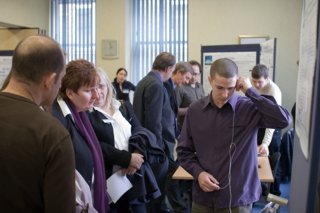
Chris Martin (University of Dundee) demonstrating activity
monitoring
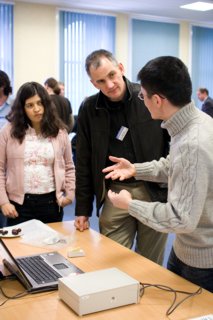
Nubia Gil (University of Dundee) and Feng Wang (University of
Stirling) explaining a point
Programme
- 09.15 Welcome and Introduction to MATCH
-
Prof. Ken Turner and Louise Bellin, Computing Science and Mathematics, University of Stirling
Ken Turner is professor of Computing Science at the University of Stirling, and technical director of MATCH. His research interests include home networks, service provision, and medical devices. Louise Bellin is project manager of MATCH. She has over 15 years experience in a variety of roles covering project management, business analysis, marketing and communication.
In this talk, Ken and Louise will present the context in which MATCH is operating, and will highlight some of the challenges that integrated home care systems must meet.
- 09.40 From Telecare to Holistic Care: Experiences from Liverpool and A SAPHE Future
-
Nigel Barnes, Pervasive ICT Research Centre, BT Group Chief Technology Office
Nigel Barnes leads the Telecare research group within BT's Pervasive ICT research centre at Adastral Park near Ipswich. He has been involved in telecare research at BT for the last ten years, focusing on the use of non-invasive monitoring to provide proactive alarm and long term wellbeing monitoring solutions. He has led the Liverpool Telecare Pilot that BT has been operating with Liverpool City Council and Liverpool Direct Ltd. for the past three years. He now leads BT's involvement in the DTI collaborative project called SAPHE (Smart and Aware Pervasive Healthcare Environment).
In this talk, Nigel will provide an overview of the Liverpool trials and the experience that has been gained. It will be seen how this work extends from social care into health care. An introduction to the SAPHE project will show how a more integrated and pervasive solution could better support people. It could also facilitate a move to holistic care management encompassing social, health and lifestyle wellbeing.
- 10.10 Speech Technology for E-Inclusion and Rehabilitation
-
Prof. Mark Hawley, Centre for Clinical Applications of Speech Technology, University of Sheffield
Mark Hawley is Head of Medical Physics and Director of R&D at the Barnsley Hopsital NHS Foundation Trust, and Visiting Professor at the University of Sheffield. He heads a research group on Assistive Technology and Telecare, studying and developing applications of technology in assisting and rehabilitating disabled and older people.
In this talk, Mark will concentrate on the work of the Clinical Applications of Speech Technology group, a joint research group between the Hospital and the University. Speech technology is potentially of enormous benefit to people with physical disabilities. Applications of speech technology will be reviewed and described in the areas of access, control, communication and rehabilitation, with particular reference to speech technology developments for people with disordered speech. This is a challenging area that requires multidisciplinary research and development. To be successful, applications should effectively take into account the needs of user groups and have the ability to adapt to the needs of individuals.
- 10.40 Technology for Tailored Healthcare
-
Prof. David Marples, Chief Scientist, Telcordia
Dave Marples is Chief Scientist in the Network Systems Research Lab at Telcordia Technologies, Piscataway New Jersey, where he has mostly worked since 1999. He has also worked with Global Inventures Inc., where he was responsible for the management of the Open Services Gateway Initiative (OSGi). He has overseen the development of the Networked Appliance research programme at Telcordia, and is now working in the field of vehicle telematics, automotive prognostics and diagnostics. He is a Fellow of the OSGi, and is Honorary Professor of Communications at the University of Stirling.
As we move towards bespoke healthcare tailored to the needs of the individual, with a focus on non-invasive monitoring, the need arises for an in-home computing platform which can be configured according to the requirements of the individual being monitored. Such a platform needs to highly reliable, long-lived, hacker-proof and highly configurable. It needs to support a huge range of programs, not all of which can be developed, or even conceived, at the time that the platform itself is created.
The pluggable service architecture developed by the Open Services Gateway Alliance Initiative has been created with exactly these needs in mind. Developed for use in a wide range of different environments, from the automobile through to the mobile phone, it is the ideal basis for creating a homecare ecosystem into which individual components can be plugged upon demand.
In this talk, Dave will discuss the fundamental underpinnings of the OSGiA Service Platform. He will provide examples of how it can be physically realised in a set-top box, a burglar alarm, or perhaps a mobile phone.
- 11.10 Tea/Coffee
-
Served on the first floor.
- 11.30 Isolation and Social Exclusion: How can Technology help?
-
Prof. Andrew Monk, Centre for Usable Home Technology, University of York
Andrew Monk is Director of the Centre for Usable Home Technology (CUHTec) at the University of York. He is professor of Psychology and a Fellow of the British Computing Society. His work has been concerned with taking a user-centred approach to the design many kinds of information and communication technologies. Most recently this has taken the form of research on technological support for older people who wish to live independently.
We all try to use technology in a way that puts the user/client/patient at the centre of our considerations. In this talk, Andrew will show how to view assistive technology and telecare as a service to the user/client/patient. It will be suggested that a really user/client/patient-centred approach gives isolation and social exclusion a much more prominent priority. It will also be shown how technology can help.
- 12.00 Technology as part of The Assessed Care Package - The Challenges and The Champions
-
Linda MacPherson, Housing and Social Work Falkirk Council
Linda Macpherson is the Team Manager in Falkirk Council responsible for the Community Alarm Service and its Mobile Warden Response team. She manages a service where passive and assistive alarm technology have been mainstreamed since 1991 and has helped develop a falls management project using falls detection technology which was a national award-winner in 2005.
In her talk, Linda will outline the importance of technology being included in the assessment process, and will explain some of the positive outcomes which can be achieved. She will discuss the challenges of making technology-inclusive assessment a reality, the ethical dilemmas this presents, and the training agenda for the future.
- 12.30 The Design and Evaluation of New Technologies to support People with Dementia
-
Prof. Roger Orpwood, Bath Institute of Medical Engineering University of Bath
Roger Orpwood is the Director of the Bath Institute of Medical Engineering at Bath University, an engineering design and development organisation with a major focus on assistive technology. The institute has been involved for many years in the development of technological approaches to supporting people with dementia, both in their own homes and in care settings, with a recent interest in more directly supporting quality of life.
Roger will discuss the development of new technologies to support people with dementia. He will demonstrate the kinds of outcomes that can be achieved with a sensitive, user-centred approach to design. The talk will underline the importance of a team approach to design, where end users, personal and professional carers all need to be involved - in defining the issues to be explored, and in guiding the evolution of new designs.
- 13.00 Lunch and Poster Sessions
-
Posters from project members will exhibited on the third floor. Delegates are invited to view these during the lunch break.
- 13.45 Demonstration Sessions
-
MATCH team members will have a number of small exhibits on the third floor. During this session, delegates are invited to visit these exhibits and to meet with project staff. The research to be demonstrated is as follows:
- use of digital pen and paper for recording care activities
- policies for control of home automation
- issues in use of home care technology
- speech-based communication
- automated display and analysis of home sensor data
- audio reminder system
- gestural and tactile interfaces
- technology integration in MATCH.
- 14.45 Tea/Coffee
-
Served on the first floor.
- 15.00 Barriers to The Uptake of Home Care Technology
-
Prof. Evan Magill, Computing Science and Mathematics, University of Stirling
This session will explore a variety of issues with the invited speakers as a panel and with the audience. Three topics are of particular relevance: pragmatic factors, ethical concerns and usability issues. An electronic voting system will be used to gather the general feeling of the audience on various questions.
- 15.45 Colloquium Summary
-
Prof. Ken Turner and Louise Bellin
- 16.00 Colloquium End
-
| MATCH Home Page | About MATCH | News & Events | People | Partners | Contact Us | ||
| Original Text and Images © MATCH Partners | Privacy Statement |